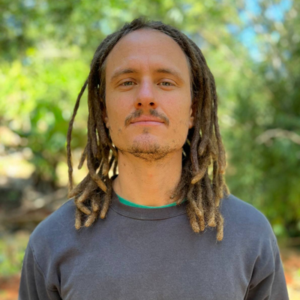This article is the second of our four-part series featuring workers displaced by the recent waves of tech layoffs who used the transition to found their own companies. In Part One we chatted with investors and founders and looked at data for early-stage startups. Part Three explores the role of startup accelerators, and we profile a former tech worker turned founder in Part Four. Today we meet entrepreneur Peter Henry, and we’ll be following Henry’s journey in future articles as he continues building his startup in Latin America. — Special Projects Editor Christine Kilpatrick
Growing up bouncing between southern Florida and Puerto Rico, Peter Henry knew one thing for certain — always have a Plan B.
Being raised by a single parent, money was tight. When disasters hit — such as hurricanes — hard times quickly became harder.
“I remember, I think, it was Hurricane George. It was devastating,” said Henry, remembering bathing outside in what little water was available. “We went through some rough times. But you can’t rely on others, you rely on you.”
Search less. Close more.
Grow your revenue with all-in-one prospecting solutions powered by the leader in private-company data.
Those experiences — and that mindset — helped prepare Henry for what came last fall. Like the hundreds of thousands of other employees in the tech industry, Henry was laid off from MetaMap where he was vice president of revenue.

“It was tough, but it also was an opportunity,” said the 33-year-old Henry. “You can either cry about it or move on.”
Henry moved on to Agricompa, a fintech company that enables small and medium-sized farmers in Latin America to access loans and other services specifically for them.
While many may seek out the cold comfort of a new job with a well-established company after the trauma of a layoff, Henry — and many others like him — have instead used the tech job cuts as their chance to pursue their dreams.
“In a sense, it was a relief,” he said, “I could focus on what I wanted to do.”
Lessons from baseball
What Henry wanted to do was help Latin American farmers after seeing firsthand many of the issues they faced.
In 2013, Henry bummed around Venezuela playing baseball after taking time off from Stanford and that school’s baseball team.
“I hung out at farms,” Henry said. “I actually did my thesis on the informal economy in Venezuela.”
Even after graduating, Henry continued to hang around Latin America, first taking a baseball development job with Major League Baseball before moving on to a sales job in Puerto Rico for PayJoy — which offers credit to underserved consumers in emerging markets around the world — in 2015.
The job appealed to Henry and his personality for several reasons. First, sales stoked his competitive fire like baseball and sports did. He could prepare and plan for sales — just like he would practice and train in baseball.
“Winning a sales call is like winning an at-bat,” Henry recalled. “I also liked that it’s about tribulations, persistence and consistency. In baseball, you have to learn to accept failing. I couldn’t, I used to let the strikeouts get to me.
“Now, I don’t let that phase me,” he said
He also fell in love with the entrepreneurial and startup aspect of the business. Lastly, he liked the impact he thought the company could have.
“Bouncing between the U.S. and Latin America, I sometimes didn’t have the right paperwork or ID, so I could relate,” Henry said. “I liked the positive social impact.”
After 17 months there, Henry followed that entrepreneurial spirit he fell in love with and co-founded Miami-based online real estate company Home61 before moving on to fintech identity startup MetaMap.
There, Henry led the expansion for sales, product, marketing and customer success in all of LatAm, Brazil, Africa and Southeast Asia. He helped grow revenue from zero to $18 million ARR in 18 months.
Hard times
During his time at MetaMap the seeds for his future were planted — literally.
When the pandemic hit, Henry was living in Mexico City. Not enamored with the idea of isolating with the city’s other 9 million people, he and his wife Oris went to the Dominican Republic and bought a three-acre farm.
The idea of farming and being self-sufficient appealed to Henry, and the isolation of the pandemic seemed a perfect time to try it out.
However, that would not be the only life-changing moment about to happen for Henry.
In October of last year, Henry got the call that he and his team were being laid off. His job, with a $240,000 salary and $130,000 in bonuses, was gone.
While a layoff can be a traumatic milestone for many, Henry’s baseball career would not let him see it that way.
“In sports, you can always be waived or let go,” Henry said. “So I always have the feeling you can be let go at any time.”
His upbring also prepared him for such a moment. Growing up in a home where finances could sometimes be “mismanaged” taught Henry the importance of saving for a rainy day.
“I always had something saved, I always have a Plan B,” he said.
Growing up in the midst of the Global Economic Crisis in 2008, also likely affected his mentality toward money and savings, he added.
“These crises affect how you deal with a lot of stuff,” he said.
Support from those close to him also did not hurt.
“My wife always has pushed me to do my own thing,” he added.
Fintech for farmers
A few days after getting the layoff notice, what would become Agricompa was founded with three of his former MetaMap partners — Pierre Antoine Rohr-Lacoste, Carlos Ruiz and Amaury Soviche.
Through talks with coffee roasters and cacao farmers in Mexico, Colombia and Africa, Henry knew small growers seemed to always suffer from cash-flow issues.
One of the main issues is limited access to cash, Henry said. Many farmers in Latin America don’t have the paperwork or documentation for their farms, limiting the extent the property can be used as an asset.
There also is not immediate accessibility to a bank in many of these regions.
“In some of these rural areas, you can be two to three hours away from a bank,” he said.
There also can be hangups in the time it takes distributors and packing companies to actually pay small farmers.
Henry knew he could help fix some of these problems.
“I’m not a pro farmer, but I’m a pro at building teams and startups,” he said.
While the startup is still in beta-stealth, the concept is to offer an all-in-one agro management platform that allows packing and trade companies to manage cash flow and consolidate operations while being able to pay out farmers quickly with fast and hassle-free financing and ERP solutions.
Despite not being fully launched, 150 farmers are already on the platform. The company has eight employees and plans to operate first in the Dominican, Mexico and Colombia.
The startup also has raised $100,000 from Day One Ventures’ Funded, not Fired program that is supporting laid off tech workers’ dream of starting their own companies.
“Day One has been great,” he said “We do a weekly call with other founders in Day One’s portfolio. It has been really helpful.”
The company also has additional money from other angel investors and the like. Henry expects to start seeking out a proper Series A in the final quarter of the year.
Henry, who has always had a passion for farming and roasting coffee, has great expectations for what the company can become as he writes the next chapter of his story.
“We want to be the Shopify for agro,” Henry said.
Illustration: Dom Guzman

Stay up to date with recent funding rounds, acquisitions, and more with the Crunchbase Daily.












67.1K Followers